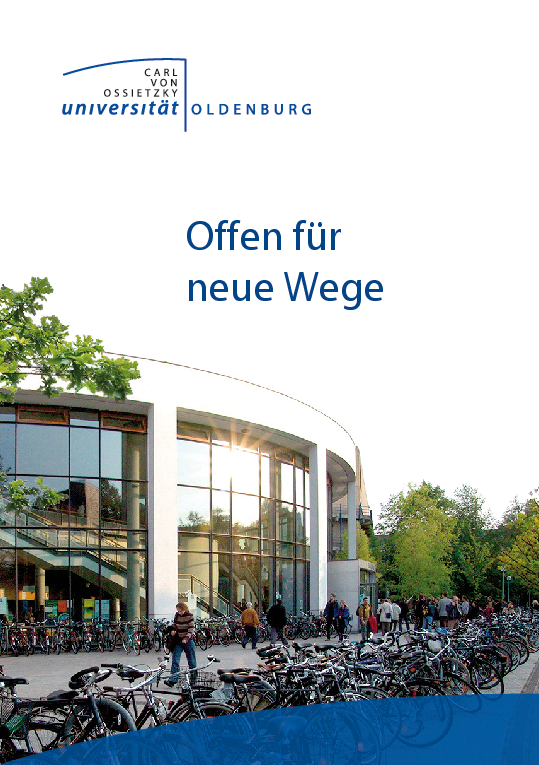Why SEM in Oldenburg?

Focus on sustainability at the University of Oldenburg
Research and teaching with a focus on environmental protection and sustainability have guided the University of Oldenburg since its foundation in 1973. With its location near the coast, two main areas of research emerged early on: marine research (especially shallow sea and coastal research) and research on renewable energies. Regarding renewable energies, the University of Oldenburg is one of the leading universities internationally and offers a variety of study programmes in this area. Several directors of the Fraunhofer Institute for Solar Energy Systems in Freiburg have previously worked as physicists in Oldenburg. Also, other prominent faces of sustainability research, such as Claudia Kemfert, Niko Paech or Uwe Schneidewind, have worked at the University of Oldenburg for many years.
Aside from its focus on natural sciences, since 1997, ecological economics have become an evenly important part of the university’s academic orientation. This focus was established at a time when ecological issues had little or no relevance in economics in Germany. This long tradition makes the University of Oldenburg nationally and internationally one of the pioneers in this field. The university has expanded its ecological research also into social, computer, educational and other sciences.
The COAST research centre, founded in 2005 COAST Research Centre which was founded in 2005, bundles the activities of this sustainability research at the University of Oldenburg. The centre's aim is to make the University of Oldenburg a leading location in Germany for transdisciplinary research and teaching in the field of sustainability - while maintaining a clear focus on the coast.
COAST can draw on the expertise of five member institutions are available to it:
- CEM Center for Environmental Modelling
- CENTOS Oldenburg Center for Sustainability Economics and Management
- ForWind Centre for Wind Energy Research
- ICBM Institute for Chemistry and Biology of the Sea
- ZENARiO Centre for Sustainable Spatial Development in Oldenburg
Within COAST, the teaching activities of the sustainability-related study programmes at Bachelor's, Master's and doctoral level continue to be coordinated and designed. This also includes the Master's cluster "Environment and Sustainability", which, in addition to the SEM degree programme, includes a wide range of other research and application-related degree programmes. Depending on the focus of interest, students can select diverse modules from the natural, social and economic sciences as well as the fields of energy and the environment.
City of Oldenburg
Oldenburg is an attractive and bustling city for students, that is known for its connection to sustainability. Its charming city centre is one of the oldest and largest in Germany. Particularly noteworthy is the wide range of cultural activities the city offers its residents, such as the Kulturetage (culture days), the Oldenburg State Theatre or the Literature Office, to just name a few.
Beyond that the city benefits from a well-developed network of cycle paths and its proximity to the North Sea, where visitors can admire one of the UNESCO World Heritage Sites, the ‘Wattenmeer’. According to the Institute of Economics, over the last five years the city of Oldenburg achieved the largest improvement in the quality of life throughout Germany. In addition, the city aims to be climate-neutral by 2035 and is Fair Trade certified.
Facts about the city of Oldenburg:
- approx. 168,000 inhabitants
- 34 city districts
- One of the four largest cities in Lower Saxony
- Awarded the status of Fair Trade Town in 2019
- City of Science 2009
- According to a study by the Austrian Transport Club (VCÖ) in 2016, Oldenburg is one of the most bicycle-friendly cities in Europe
University of Oldenburg
We have to make science more human again.
Nobel Peace Prize Laureate Carl von Ossietzky (1889 - 1938)
The Carl von Ossietzky University was founded in 1973. This makes her one of the younger universities in Germany. Their goal is to find answers to the central questions of society in the 21st century - with leading interdisciplinary research and teaching.
The university works closely with more than 200 universities worldwide. Besides, it is connected with non-university institutions in research, education, culture and business. The research location will be further strengthened by the establishment of the Helmholtz Institute for Functional Marine Biodiversity, a Max Planck junior research group and three Fraunhofer working groups. In addition, there is the Virtual Helmholtz Institute.
Facts about the University of Oldenburg:
- 6 faculties
- In total around 16.000 students
- Employment of 222 professors
- Offer of 101 courses of study
- 1.300 study seats in the university library
- Registration within the SEM programm per year: 45 students


